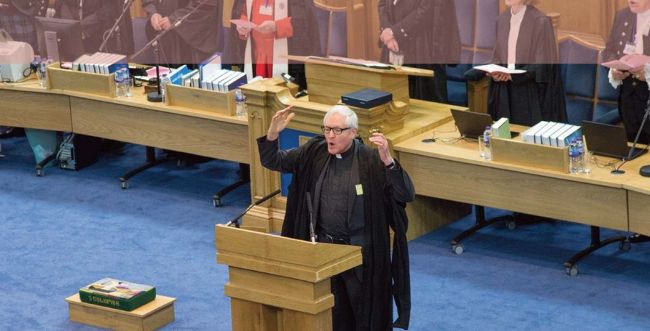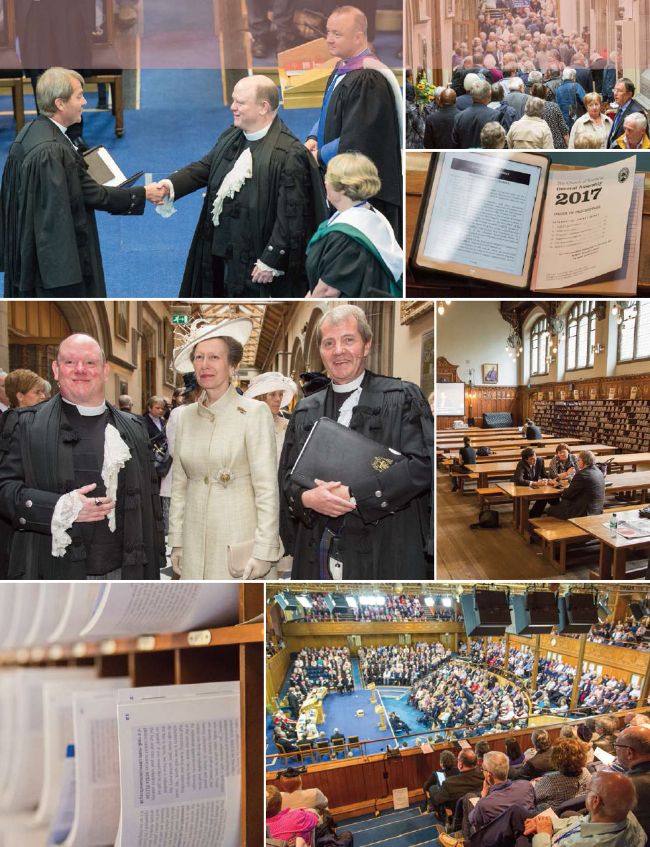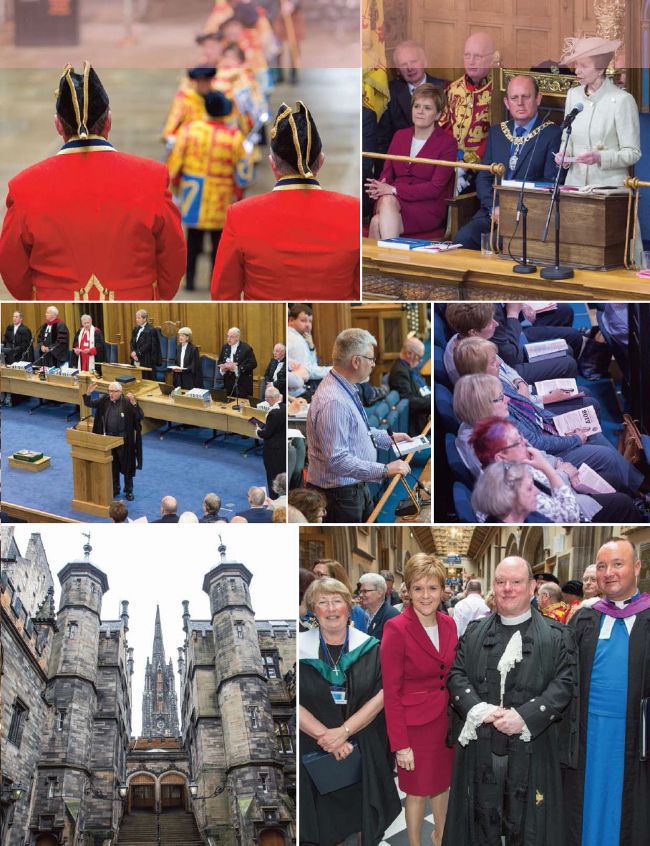Thomas Baldwin reports on the business debated at this year's General Assembly in Edinburgh in May.
SAME-SEX MARRIAGE
In the end, the two sections of deliverance which had occupied most attention before the General Assembly of 2017 went through almost on the nod.

Photos: Derek Fett Photography
Not that the report of the Theological Forum was not controversial: the debate lasted over three hours and included multiple votes, including one which would have refused to receive the relevant sections of the report altogether (which was defeated by 298 votes to 149).
But when it came to the section inviting the church to ‘take stock of its history of discrimination at different levels and in different ways against gay people and to apologise individually and corporately and seek to do better’, it was passed without objection.
The only comment at this point came from elder Ishbel Smith, who said: “I am the church, you are the church, we are the church; and it is our duty to take this deliverance into our churches and consider it, and not to ignore it.”
Similarly, the instruction to the Legal Questions Committee to ‘undertake a study of the matters which would require to be addressed in any new legislation permitting Ministers and Deacons to officiate at same-sex marriage ceremonies’ passed without comment.
Under a proposal from the Rev Peter Johnston, the sections on same-sex marriage were prefaced ‘recognising the Church’s doctrine and practice in matters of human sexuality and marriage’. Mr Johnston said this offered room for people from the traditionalist position to have their views respected. He also said that he was asking to be in a position to perform the marriage of his gay daughter, in the same way he could his three straight children.
This defeated a similar but more detailed counter-motion proposed by the Rev Dr Alan Hamilton, which referenced previous statements, reports and decisions of the General Assembly.
The Rev Hector Morrison moved a countermotion which would have removed sections of the report summarising the traditionalist position; a motion backed by some commissioners who said they didn’t recognise how it represented their opinion. Edinburgh elder Scott Burton said it was ‘a caricature’ and that he was ‘hurt’ by it. However, this was defeated by 269 votes to 191.
Forum convener the Rev Professor Iain Torrance said that the approach they had taken had aimed to create a situation ‘Where both sides can flourish, both may be protected and both may be celebrated’. He later added: “I believe that the middle of the road is habitable, and with a will we can make it habitable. By inhabiting the middle of that road, recognising this, we can be an example to other people.”
At the end of the week, the retiring Principal Clerk, the Very Rev Dr John Chalmers, said that he hoped issues around human sexuality would not hang over his successor the way they had over him.
OPEN HANDS, NOT CLENCHED FISTS
The debate of the Church and Society Council took place in the shadow of the previous evening’s Manchester bombing.
Convener, the Rev Dr Richard Frazer, whose speech was themed around the contrast between meeting people with a raised fist or an open hand, said: “We have seen in the last 24 hours the consequences of the raised fist. How are we to react – with more clenched fists, or with that vulnerable open hand?
“We refuse to raise the clenched fist. We hold out open, asking hands. It’s in that space that we continue to meet the living Christ.”
He added: “It is important for us to recognise the immense courage of those who do not run away, but run towards chaos, offering that open hand of care, support and love.”
A new section was added to the deliverance: “Express profound sympathy at the attack at Manchester Arena and the tragic and pointless loss of life, affirm the courage and grace with which Manchester is already responding; call on the Church to continue to foster deep relationships across communities, and commit us to pray for all those affected.”
Earlier, the Moderator, the Rt Rev Dr Derek Browning, said: “There is no cause, political or religious, that justifies actions of senseless brutality, anywhere or at any time.
“In times like these we are not defeated by fear. We stand quietly in our faith. God remains with us and all of his children.”
The Assembly held a minute’s silence the morning after the atrocity, in which 23 people died; it also joined in the nationwide silence the following Thursday.
There were prayers also for the 29 Coptic Christians killed in a gun attack on a bus in Egypt on Friday May 27.
CALL TO PRAY
On the opening day, the General Assembly issued a call to the Church to pray ‘that God will do fresh work amongst us as God’s people’, as it faces the challenges of falling membership and financial pressures.
The deliverance of the Council of Assembly instructed Presbyteries and Kirk Sessions to ‘consider how best to respond to this call’ and the Council itself to prepare resources supporting it.
Dr Sally Bonnar, the Council convener, said that the Church may have reached a ‘tipping point’ when falling membership numbers begin to result in falling income.
The call to prayer was welcomed by the Rev Gordon Kennedy who said: “I hope that the church will not only pass this but hear it and act on it.”
‘JUST PEACE’ CALL
The General Assembly called for a ‘just peace’ in Israel/Palestine, and condemned the expansion of illegal settlements on Palestinian land.
However, it stopped short of endorsing economic sanctions against Israel, after one of the Church’s ministers in Jerusalem said that would amount to ‘reckless endangerment’ of its institutions and activities in the Holy Land.
The Assembly was discussing the joint report by the World Mission and Church and Society Councils on the centenary of the Balfour Report – the letter sent by then British Foreign Secretary (and Church of Scotland elder) Lord Balfour which stated that the British Government favoured the establishment of a Jewish state in Palestine.
The Secretary of the World Mission Council, the Rev Iain Cunningham, said that the report, which calls for sensitivity in marking the declaration and commends non-violent means of resolving the difficulties in the Holy Land, a ‘suitably balanced response’ and urged the Church ‘to engage prayerfully and practically in the pursuit of a just peace for all’.
Changes to the deliverance which hardened the language of condemnation of illegal Israeli actions and recognised the suffering of the Palestinian people were accepted, as well as one expressing ‘deep concern in regard to Hamas’s continued declaration… that Israel does not have the right to exist’.
However, part of a counter-motion from the Rev Tom Gordon which called for ‘the adoption of economic measures to pressure the state of Israel to comply with international law’ was rejected. The Rev Paraic Reamonn, minister of St Andrew’s Jerusalem, said that it could cause the Church to fall foul of Israeli laws against organisations calling for economic sanctions: “It could put all of our organisations in Israel at risk.”
“WE ARE THE HANDS AND EARS OF CHRIST TODAY”
The convener of the Ministries Council paid tribute to all who exercise ministry in the Church of Scotland.
The Rev Neil Glover said: “They bear witness to the most remarkable truth – that the angels do not change a world of hurt and pain into a world of love. It is we – our frail human selves – who are the hands and ears of Christ today.”
The Ministries report included the launch of Ascend, the new support and development service for everyone involved in ministry and pastoral support through the Church of Scotland. Mr Glover said:
“Ascend is a central location to find the core services provided by the Ministries Council for support and development for those in ministry.”
Discussions again focussed on approaches to dealing with the ever-growing vacancy rate, particularly in remote rural areas where several presbyteries are at 50% vacancy or worse.
The Very Rev John Christie pointed out that very few of the Commissioners to this year’s General Assembly were interim moderators, and called on those who were there to remember ‘those congregations where there is no minister, and no prospect of one’.
FUTURE OF THE YOUTH ASSEMBLY
The Assembly approved the decision to discontinue the National Youth Assembly (NYA) in its current form after 2019, with proposals on its replacement to be drawn up over the next two years. The proposals will be drawn up by a committee made up by a majority of young people.
Mission and Discipleship Council convener the Rev Norman Smith said: “If we say we are going to let our young people shape something, we have to let them shape something… and it will be something that hopefully is as cherished for the next generation as the NYA is for the current generation.”
Mr Smith also made a commitment that the NYA would not be stopped until there was something in place to replace it.
Giving the report of last year’s NYA, Moderator Andrew Macpherson urged the Commissioners to talk to people about mental health, to help remove the stigma around the subject.
ARMED FORCES COVENANT
During the report of the Committee on Chaplains to HM Forces, the Assembly approved the Armed Forces Covenant, which commits the Church to support serving and veteran members of the Armed Forces and their families. The convener, the Rev Gordon Craig assured the Assembly that signing the covenant would have no impact on the Church’s ability to criticise the Government’s defence policies.
As ever on ‘Chaplains’ Day’, the Assembly was addressed by a senior member of the Armed Forces, this year Air Marshall Stuart Atha, Deputy Commander Operations at RAF Air Command. He said: “We live in uncertain times, and at such times your encouragement, your help to see the light despite the gathering clouds, and your support for servicemen and servicewomen and their families is both needed and treasured.”
OTHER DEBATES AND DECISIONS
• The Assembly approved a series of themes based around ‘stories’ for the years 2018-2020. Mission and Discipleship Council convener, the Rev Norman Smith said: “These themes offer us a chance for the Church to celebrate our story. We have a story to tell that is stronger when we are together. What holds us together is stronger than what pulls us apart.”
• There was condemnation of the practice of female genital mutilation (FGM) and a call to the government to consider the risk of FGM when assessing asylum claims. The Rev Christopher Rowe spoke of feeling unable to change the nappy of a two-year-old girl, the daughter of asylum seekers in his congregation, who faces the prospect of FGM if they are returned home.
• The Assembly approved a call to the UK Government to block ship-to-ship crude oil transfers in the Moray Firth.
• The Rev Louis Kinsey had a motion passed instructing the Mission and Discipleship Council and other relevant bodies to reexamine the Church’s current rule under which children must be baptised before receiving Communion.
• There was applause for the Rev Roddy MacLeod, who is retiring shortly after editing Life and Work’s Gaelic Supplement since 1980.
• Rosemary Johnston, convener of the Church of Scotland Guild, said the organisation has over 20,000 members and a presence in 801 congregations; and had raised £467,665 so far for its six current partner projects. Churches without a Guild were encouraged to consider setting one up, but also reminded that they could support the work of the Guild through its projects.
• The Council of Assembly was authorised to continue examining the options for the central church buildings at George Street, Charis House (CrossReach offices) and the Assembly Hall. Possible options are to simply maintain the existing accommodation; to partly sell or rent out some of the office space; or to move out of George Street altogether.
• The convener of the Social Care Council, Bill Steele, said it would cost about £2.4 million to implement the Scottish Living Wage for all CrossReach staff and to maintain the differentials to higher-paid employees. In his speech he said that ‘unless funding agencies include this in the purchasing of the services we provide for them, the costs are prohibitive’.
• The Assembly passed the change to CrossReach’s employment practices under which care and support staff will no longer need to be professing Christians, instead being required ‘to give a commitment to be respectful of our Christian ethos and commit not to undermine it’.
• While introducing the World Mission report, council convener the Rev Iain Cunningham said that ‘it is a scandal to the gospel we profess’ that ‘gender discrimination, gender injustice and gender-based violence of all forms are all still endemic and ingrained within human society as a whole and, sadly, also still within the global Christian community’.
• However, there was some comment from the Assembly that the Church of Scotland had some way to go itself in gender equality, with the Rev James Sharp calling for congregations that do not recognise female ministry to be ‘named and shamed’, and the Rev Alec Shuttleworth pointing out that only three of the 16 most ‘influential and visible’ people in the Church (which he defined as the Moderator, Principal Clerk, Council conveners and secretaries) were currently women.
• A section was added to the deliverance of the Hymnary Trustees, instructing them to publish the hymnary ‘in a format more easily accessible to the visually impaired’.
• Iain Douglas, chairman of the General Trustees, urged churches not to delay repairing defects reported in quinquennial reports. He said: “Things that are reported as defects and not addressed is one of the most serious problems we face.” Mr Douglas also warned churches to consider whether they loved their buildings more than their mission.
• Prince Ghazi bin Muhammad of Jordan became only the second Muslim to address the General Assembly. He warned of a bleak future for the next 25 years across the world, based on current technological, social, religious, political and environmental trends. However, he said that the solution to many of our problems could lie in everybody coming off the internet for an hour each day and engaging in ‘solemn, solitary, systematic reading’.
• The Safeguarding report included an address from the international dementia expert Professor June Andrews, who urged churches to do all they could to maintain older people’s access to their church, as essential to maintaining the highest possible level of independence.
• The Chief Executive of Christian Aid, Loretta Minghella, told the Assembly that the partnership between the Church and the development agency was‘transformational’. She said: “We are your international development agency, and it is your unflagging commitment that drives our work forward. We share your belief that poverty is an avoidable scandal that robs people of their dignity and diminishes us all.”

• Two chairs were kept empty at the Assembly for the Rev Rola Sleiman, of Syria, and South Sudanese representative the Rev James Makuei Choul, who were both unable to be present because of visa problems. A new section was added to the World Mission report instructing ‘the Council and other relevant bodies or individuals to continue to work with Government, especially the Home Office and the Foreign and Commonwealth Office to ensure that the Church of Scotland is recognised as an institution whose word is accepted in all UK Embassies, High Commissions and Consulates around the world when visa applications are being considered’.

photo credits: Derek Fett Photography
• During the opening session, the retiring Moderator condemned the level of homelessness in Scotland as ‘unacceptable’. The Very Rev Dr Russell Barr said in his address that the latest figures for homelessness were little different from what they were 25 years ago, and that 5751 pre-school and school-age children were registered as homeless at the end of last year – an increase of 17%. With First Minister Nicola Sturgeon and Scotland’s civic local authority leaders watching, he added:
"The galling thing is that it need not be like this. All the research has been done, the causes identified. The one thing missing is the political will and ambition to resolve it.
For more news follow us at www.lifeandwork.org